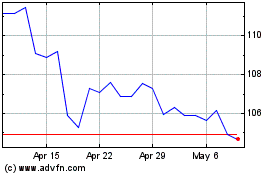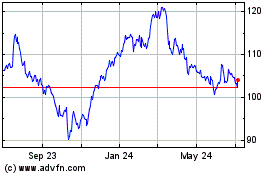Drug pricing, a key issue in the federal investigation of
Valeant Pharmaceuticals International Inc., has been a frequent
focus of federal prosecutions and whistleblower lawsuits in recent
years.
Pharmaceutical companies have paid more than $3 billion in fines
to resolve pricing cases over the past decade, according to Patrick
Burns, co-director of Taxpayers Against Fraud, a group that
promotes whistleblowing.
Valeant said late Wednesday that it had received subpoenas from
U.S. attorneys' offices in Manhattan and Boston seeking materials
on a range of matters, including the financial aid it gives
patients to pay for out-of-pocket costs as well as the pricing of
its drugs. The company said it plans to cooperate with the
investigation.
The news sent Valeant shares down 4.8% to $168.87 on Thursday.
Valeant has lost more than a third of its value since its shares
peaked at $262.52 in early August, partly on worries about scrutiny
of its drug-price increases.
Valeant said Thursday that it "has been shifting away from
transactions that are dependent on price increases in order to meet
our internal target returns" and that it doesn't boost prices on
the "vast majority of the thousands of" company products.
Democrats in Congress have asked Valeant to provide information
about steep price increases by the company for two drugs that were
featured in an April article in The Wall Street Journal. In
response to one such request from Sen. Claire McCaskill of
Missouri, Valeant said Wednesday that the price increases had no
effect on patient access and little impact on most hospital budgets
and Valeant's revenues.
It isn't clear what specific information federal prosecutors are
seeking about Valeant's pricing. But past probes highlight some key
ways that drug makers can run afoul of the law, in particular in
the way they charge Medicare and Medicaid.
Among the biggest settlements was the more than $650 million
that Merck & Co. agreed in 2008 to pay to settle allegations
that it, in part, failed to give the federal Medicaid
health-insurance program the same levels of rebates it gave other
customers for drugs including cholesterol pill Zocor and the
now-withdrawn painkiller Vioxx. Merck said at the time that it had
long since taken the initiative to enhance its compliance program,
and that the pricing allegations resulted from differing
interpretations of Medicaid rules.
Generally in such cases, "the legal issue would be whether or
not they are giving the best price to Medicaid," says Michael
Mustokoff, a partner at the law firm Duane Morris who has both
defended and prosecuted drug companies.
Federal law requires drug companies give Medicaid the best price
for a drug offered to any customers except charitable
organizations.
Other drug-pricing cases involved allegations that Medicare and
other government health-insurance programs have paid more than they
should have because companies inflated costs when reporting their
prices to the federal government.
In 2010, Abbott Laboratories Inc., Roxane Laboratories Inc. and
B. Braun Medical Inc. agreed to pay $421 million to settle U.S.
government claims they each reported false prices for various drugs
including the antibiotic vancomycin to get larger Medicare or
Medicaid reimbursements. The companies didn't admit any wrongdoing,
and said they had settled in order to avoid the expense of
litigation.
There are several drug-pricing investigations now under way.
Pfizer Inc. is fighting a Justice Department lawsuit accusing the
company's Wyeth unit of overcharging Medicaid by hundreds of
millions of dollars for heartburn drug Protonix. Pfizer said the
government's allegations have no merit.
The federal government has taken some steps to prevent
overcharging. For instance, it has altered the formula companies
must use to determine the drug prices they report to Medicare for
reimbursement decisions.
Yet when it comes to drug pricing, "there's still potential for
wrongdoing in the area, and it has not gone away," says Patrick
O'Connell, a former Texas assistant attorney general who prosecuted
drug-pricing cases and now represents drug-company
whistleblowers.
Manufacturer-supported patient-assistance programs also can
potentially run afoul of federal rules. Federal law considers it to
be an illegal kickback if a company gives financial help to
Medicare patients so they can pay the out-of-pocket costs of their
prescriptions.
"We are concerned about the use of cost-sharing subsidies to
shield beneficiaries from the economic effects of drug pricing,
thus eliminating a market safeguard against inflated prices," the
Health and Human Services Department's office of inspector general
said in a 2005 bulletin, before Medicare's Part D drug-benefits
program went into effect.
To help Medicare patients fill their prescriptions, Valeant and
other drug companies have contributed funds to independent
charities, which then subsidize the out-of-pocket costs.
Such donations are legal. Last year, however, the inspector
general issued another bulletin saying a drug maker could be
violating the federal law against kickbacks if it made donations to
"induce" a charity to steer patients toward the company's
drugs.
In another continuing case, federal prosecutors allege in a
complaint that Novartis AG "paid kickbacks…under the guise of
performance rebates" to a Missouri pharmacy that served
kidney-transplant patients who received patient assistance and, in
exchange, the pharmacy recommended use of the Novartis drug
Myfortic.
Novartis said it contracted with a number of pharmacies, which
were eligible to receive rebates in connection with dispensing
Myfortic, but it was up to doctors to decide which drug a patient
received.
In the letter sent Wednesday to Sen. McCaskill about its drugs
Isuprel and Nitropress, Valeant said it spent $544 million on
patient assistance last year and expects to spend another $630
million this year. Valeant also said it had raised the list prices
of Isuprel and Nitropress "to ensure that the prices reflected the
value of the drugs to hospitals and patients."
Sen. McCaskill said she wasn't satisfied by Valeant's response.
"Valeant has been anything but responsive or transparent—it refused
to take any action until served with federal subpoenas, and it is
still refusing to provide answers to many of the questions I've
asked," she said in a statement.
She said she planned to keep investigating drug pricing and
Valeant's response.
Write to Jonathan D. Rockoff at Jonathan.Rockoff@wsj.com
Access Investor Kit for "CitiGroup Inc"
Visit
http://www.companyspotlight.com/partner?cp_code=P479&isin=US1729674242
Subscribe to WSJ: http://online.wsj.com?mod=djnwires
(END) Dow Jones Newswires
October 16, 2015 01:25 ET (05:25 GMT)
Copyright (c) 2015 Dow Jones & Company, Inc.
Abbott Laboratories (NYSE:ABT)
Historical Stock Chart
From Mar 2024 to Apr 2024

Abbott Laboratories (NYSE:ABT)
Historical Stock Chart
From Apr 2023 to Apr 2024
